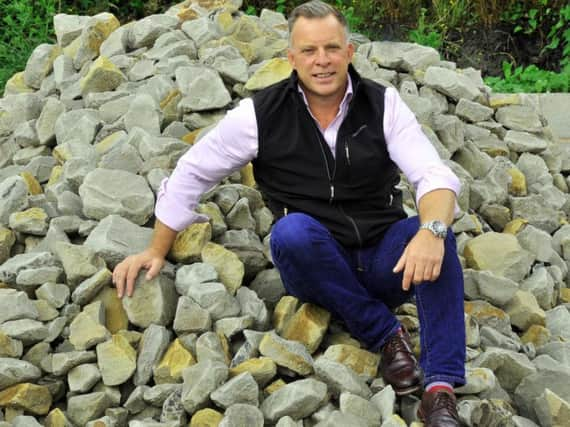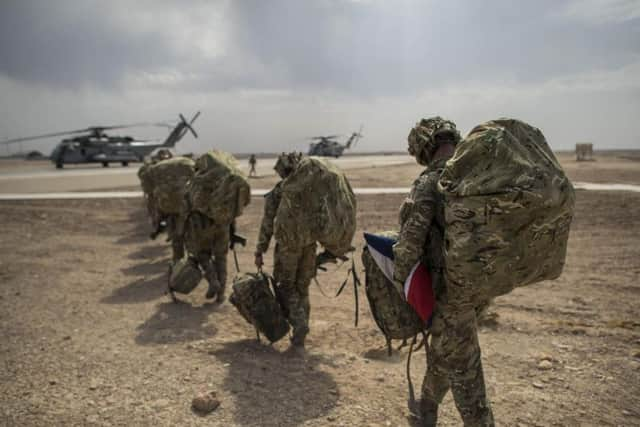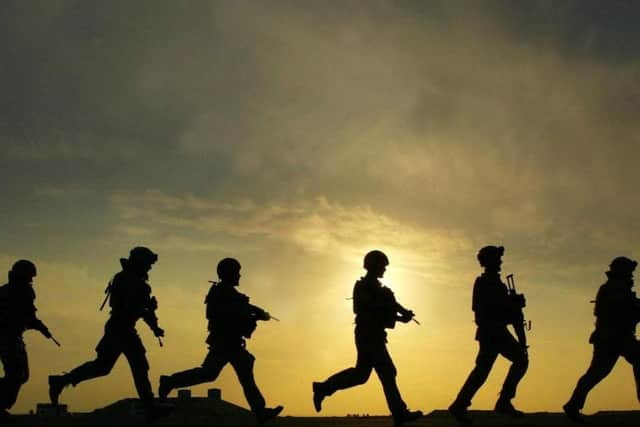'The most dangerous place on the planet' - army veteran shares experiences of life in Afghanistan war zone


Christopher Robinson considers himself to be one of the lucky ones. He witnessed death, devastation and adversity on a monumental scale on the frontline in war zones including Iraq and Afghanistan.
But he finished his 23 years in the military alive and with minor hearing loss the only physical sign of the trauma he had experienced.
Advertisement
Hide AdAdvertisement
Hide Ad“There are many, many soldiers and soldiers’ families that have not been so lucky and continue to have to deal with extreme adversity and trauma,” he says. “I’m in one piece and I don’t have any injuries. I was one of the lucky ones.”


Yorkshire veteran speaks of his journey to seek help after trauma in AfghanistanMentally and emotionally, his service in the forces has humbled him - and he has found speaking about his experiences in a talk he has recently developed has helped him with his own battle of maintaining positive mental health.
“On a day to day basis, I’m okay,” he says. “But I know that is through continuing to communicate with some close buddies and old friends but also being able to communicate through the keynote [talk].”
'It's important to talk'
“Everyone is different in terms of how their own mental health is managed,” he adds. “I find it is a great release sharing my story through Lessons from the Battlefield but also through having conversations like this, where I can explain and share these experiences with people that are unfamiliar to me as opposed to family and friends.
Advertisement
Hide AdAdvertisement
Hide Ad

Government takes action on military suicides after JPIMedia campaign“I’ve found that a great release and it’s incredibly important to talk about these things...A problem shared is a problem halved. It’s good to talk and it’s good to share feelings and emotions.”
The 46-year-old, from Bradford, joined the army in 1994 with The Prince of Wales’s Own Regiment of Yorkshire. Then aged 20, he underwent six months of basic training in York, before joining troops in Germany for a year, predominantly engaged in training exercises.
Northern Ireland
His first deployment came two years later, when he was sent on three operational tours of Northern Ireland between 1996 and 2000.
“The British Army was deployed alongside, as it was then, The Royal Ulster Constabulary to support the police force in their quest to deliver normality on the streets of Northern Ireland,” he explains.
Advertisement
Hide AdAdvertisement
Hide AdYorkshire soldier's plea over 'nightmare' battle with PTSD“We had carried out a lot of training prior to deployment so I had a reasonable understanding of the politics and the history of the conflict. But it was quite a surreal experience patrolling as a British soldier on what was perceived to be British soil. It was exciting and scary at the same time.”
In the time he was there, he says there was threat from paramilitary groups, both loyalist and nationalist.
“There was a lot of violence targeted at both the British forces and the police. We would assist the police where possible on a day-to-day basis to try to keep them safe as they in turn tried to keep the community safe.”
Though he witnessed rioting, he never experienced one-to-one fighting with the groups. “Although it could be incredibly dangerous, it wasn’t as it had been in previous years, gunfights on the streets,” he says.
Advertisement
Hide AdAdvertisement
Hide AdLater in 2000, Chris was deployed to Sierra Leone in West Africa for six-weeks, on a peacekeeping and training mission, nine years after the start of the country’s civil war.
Iraq
In the three years that followed, he was posted on training exercises to Canada, Oman, Belize, Kenya and Norway, before starting a role training new military recruits in Surrey. After three years there, he returned to his regiment in Catterick in 2006, and was deployed to Iraq in 2008.
Excitement and anticipation went through his mind. “I suppose I knew then that we were finally going to get an opportunity to do what I’d trained to do for the previous ten years, although sometimes you have got to be careful what you wish for.”
He was out there for seven months, training and living alongside the Iraqi army and offering protection from militant groups in the war-torn country.
Advertisement
Hide AdAdvertisement
Hide Ad“I knew that it was a wonderful country steeped in fantastic history that for quite a while had had a lot of internal problems politically. I felt we could add value to try and help Iraq come back to what is perceived as normality, and a peaceful environment. That was the motivation.”
“Overall, the experience was a very welcoming and warm one with a community that was impoverished yet resilient,” he adds. “Having the opportunity to live and work alongside soldiers and civilians from a different cultural background was a huge education.”
Afghanistan
Chris’ next operational tour was to Afghanistan in 2012, where he was posted for three months. “Afghanistan was a completely different beast,” he reflects.
“At the time of deployment, it was the most dangerous real estate on the planet for a British soldiers and it was a very frightening thought that there was a very real chance that we might deploy there and we might not come home.”
Advertisement
Hide AdAdvertisement
Hide AdChris’ regiment worked alongside the Afghan army and police force. “It was a very, very difficult and dangerous environment. There was a lot of engagement with the enemy (the Taliban) on a day-to-day basis. It was the first time I had experienced what I understood as a genuine war zone.”
“There were many soldiers receiving life changing injuries,” he says. “And of course, there were those soldiers that didn’t manage to make it home.”
Chris’ final role in the army, before retiring in 2017, was as part of a training team in Kenya, working alongside armies from countries including Ethiopia, Burundi, Kenya, Tanzania, Uganda and Sierra Leone, helping to train soldiers for their own upcoming operations in Somalia, where conflict is ongoing.
Adversity and mental health
It was here he came up with the idea for the management and training company, Maven Group, that he set up after leaving. He later developed Lessons from the Battlefield to give his clients an insight into his past and his experiences of dealing with extreme adversity and building resilience.
Advertisement
Hide AdAdvertisement
Hide Ad“These experiences of extreme adversity, where I’ve witnessed death and terrible things happening, actually shape the person that I’ve become today,” he says. “I have found sharing my story a great release personally and extremely comforting to know that people may learn from my experiences.”
Chris hopes the audience of his talks will be able to draw analogies about leadership, building resilience, and dealing with adversity, from his time in the military, to apply to the modern business world and he also wants to encourage employers to think about mental health.
“In my generation, growing up in the 70s and 80s, we weren’t encouraged to talk,” he says. “But it’s absolutely the right thing and it can help. If you see somebody without a smile, you should give them one of yours, because you don’t know what they might be going through.”